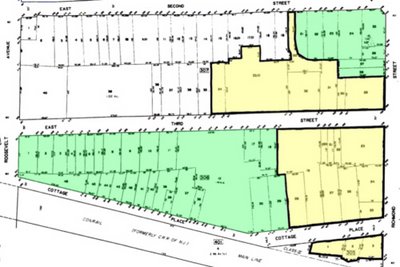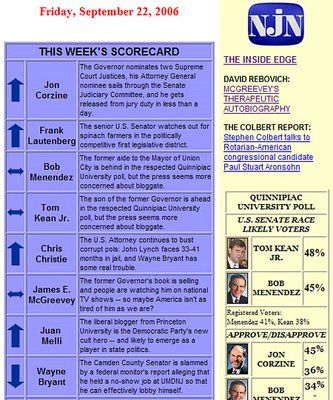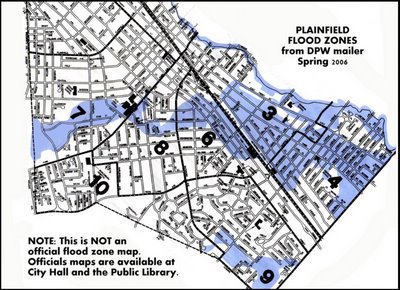Commercial Trash / Illegal Dumping
An Album With Commentary
September 23, 2006
TRASH is a fact of life. Residential trash is hauled away by the PMUA in every Plainfield neighborhood on a twice-weekly basis, and recycles are picked up weekly.
But in Plainfield, trash resulting from stores, restaurants, large apartment complexes and other businesses is the responsibility of the owner and is disposed of by private trash haulers. Keeping trash from becoming an eyesore and a public health hazard (attracting rats, for instance) is a matter of cooperation and compliance on the part of commercial property owners and tenants and vigilance on the part of the City's Inspections Division.
Problems arise when the dumpsters businesses use either are not large enough, or are not scheduled for pickup frequently enough. The following photos illustrate trash conditions in downtown Plainfield on a single Saturday afternoon in late August. They are only intended to underscore that trash can quickly become unsightly and -- in the case of examples such as number 4 from a restaurant on Watchung Avenue -- highly odoriferous and a bummer for shoppers and those who must park nearby.
The solution to problems of unsightly trash require both the mobilization of merchants and property owners through peer pressure by organizations like the SID and the Chamber of Commerce, and the constant vigilance of code enforcement officers from the City's Division of Inspections.
(As always, click on any picture to enlarge)
|
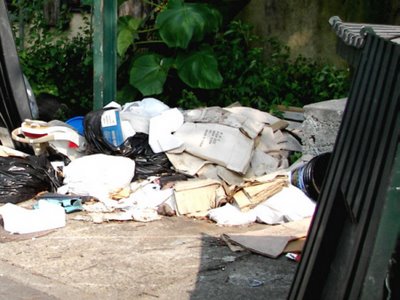
Behind the Moshell's building.
|

Another view behind the Moshell's building.
|
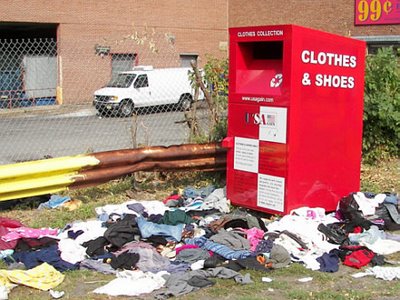
Clothes are strewn around a drop-off bin
that is not serviced frequently enough.
|

Behind a restaurant a couple of doors down
from Assemblyman Green's office.
|

The trash is not the school's,
but the impression it creates is.
|
Illegal Dumping
Illegal dumping has always been a problem. In the years before the PMUA, when the City had not sponsored a bulky waste pickup for many, many years, construction debris and abandoned household appliances, furniture and other waste could be seen curbside and in vacant lots throughout many parts of the city.
All that changed dramatically in the early years of the PMUA, when residents were given multiple opportunities a year for several years to put out bulky waste to be hauled away by PMUA crews. Once the level of put-outs had dropped, the PMUA was able to move the program to scheduling on an appointment basis.
Recently however, illegal dumping has been noticed in various locations throughout the city. The pictures below are only illustrative of the kinds of issues encountered. All were taken on one afternoon, except for the mattresses and debris on West 6th Street.

Grace Episcopal Church's retired sexton, Joe Guinee, used to refer to the cases and bags of Corona bottles that would appear next to the church's dumpster after a weekend as 'bordello basura' -- whorehouse trash -- indicating they were left there by operators of bordellos who did not want to draw the attention of the authorities by putting the bottles out in the house's regular trash. These are in a lot behind East Front Street.
|

These mattresses and abandoned household items were dumped on West 6th Street, just three blocks from City Hall.
|

Some dumping appears to be done by property owners themselves, as in the rubbish behind the Strand Theater and adjacent stores in this picture.
|

Mattresses again, in an out-of-the-way spot in Lot 9 that is hidden from the street.
|

Some items that cannot be picked up by trash haulers -- as in these tires -- are simply dumped along the street as here, on Prospect Avenue. The County offers periodic tire and hazardous waste days, but many people are either unaware or too lazy to avail themselves of the FREE opportunity. Shame.
|


